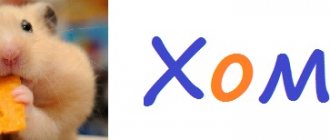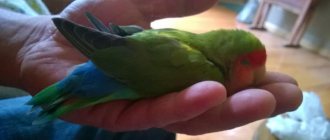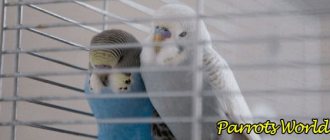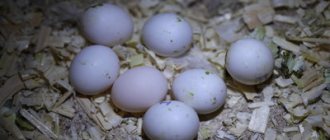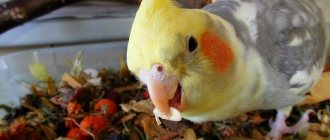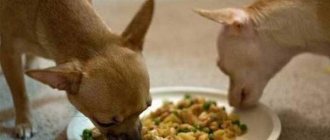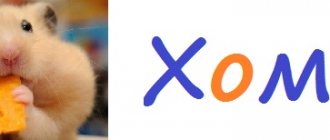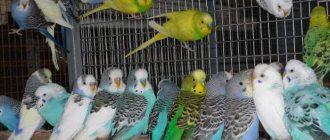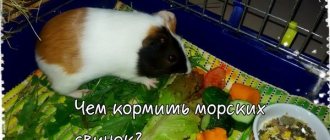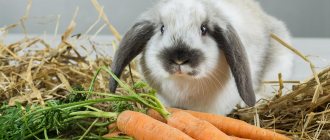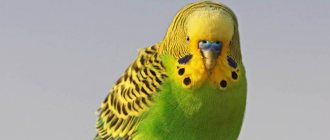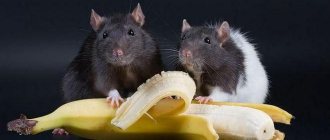Most people who get budgies for the first time start feeding them only grain crops. But the diet of birds should be varied: you need to include fruits, vegetables and even branches.
The second common mistake when feeding your pet is to give it human food, such as cheese or bread.
Which products can be included in your pet’s menu, and which ones to give up forever, we’ll look at in this article.
Grain mixtures
Cereals are the basic food for birds. This is the simplest answer to the question of what to feed your new friend.
Grains normalize the functioning of the digestive tract. Provide your pet with constant access to food.
You can purchase the grain mixture at a pet store or make it yourself. The food is available in transparent and opaque packaging. The advantage of the former is that you see the composition and quality.
In the second case, it is worth buying from trusted manufacturers. Beans must be sold in vacuum bags.
The best option is to make the mixture yourself. Optimal grain ratios (in percent):
- yellow millet - 50;
- red millet - 25;
- white millet - 15;
- peeled oats - 10.
You need to monitor the condition of the mixture. If it has aged, mold has appeared, or bugs have infested, you should not feed the parrot this.
The healthiest vegetables and fruits for a parrot
Budgerigars' favorite treats are vegetables and fruits. They contain vitamins, microelements and fiber that birds need. It is recommended to add these products to their menu all year round.
- Cabbage. The main vegetable for a parrot in winter. It is stored for a long time and contains many useful microelements. Give the leaves raw, without the stalk. Broccoli, white cabbage or Chinese cabbage are allowed.
- Carrot. Cut into small pieces or grate. Only fresh vegetables are used. Birds get vitamin C and beta-carotene from carrots. You can mix carrots with other vegetables.
- Cucumbers. Helps other products be better absorbed. Quench thirst, contain vitamins E and microelements.
- Tomatoes. In the summer season, be sure to include them in your poultry’s diet. Tomatoes contain vitamin B and ascorbic acid. Give pulp only from ripe fresh fruits. Unripe tomatoes are contraindicated for birds.
- Beet. Contains a large amount of antioxidants. It, like cabbage, is given raw all year round. In addition to saturating the bird’s body with vitamins A and C, beets normalize digestion.
Zucchini is a storehouse of fiber. Be sure to serve it raw. Useful for proper bowel function.
From fruits and berries you can give your feathered pet:
- bananas,
- apples,
- pears,
- peaches,
- pineapples,
- kiwi,
- citrus,
- pomegranate,
- cherry,
- raspberries,
- strawberries,
- strawberries
In summer, your parrot can be fed melon and watermelon.
Fruits and berries must be peeled and pitted. Cut large fruits into pieces. In winter, dried fruits, such as raisins or dates, replace fresh ones.
Now let’s take a closer look at the vitamin and mineral composition of fruits:
- Bananas are rich in potassium. Pets need this microelement just like people.
- Apples contain many vitamins and enzymes that are beneficial for poultry. Eating these fruits normalizes the functioning of the digestive system. It is advisable to give them every day.
- Pear contains pectin, carbohydrates, iron and phosphorus. Thanks to it, the pet’s body is saturated with minerals, energy, and the digestion process improves. When choosing, give preference to hard fruits.
- Peaches improve digestion processes and contain copper and iron. These fruits are given to weakened birds to stimulate their appetite.
- Pineapples strengthen the muscular and vascular systems. It is recommended to give it in canned form.
- Give kiwi to your pets during the period of vitamin deficiencies (late autumn, winter, early spring). The fruit will strengthen the immune system and protect against diseases.
- Pomegranates will ensure the healthy functioning of the budgie's cardiovascular system. The maximum daily intake reaches 1/6 of the fruit. A few grains are enough for a bird.
- Oranges are recommended among citrus fruits: they contain carbohydrates, fiber, and antioxidants. Like kiwi, it's a great food to strengthen your immune system.
You should avoid persimmons, mangoes, papaya and avocados. Let’s look further into what harm they cause to birds.
Green feed
It must be remembered that it is not enough to give birds only grain mixtures; their diet should be supplemented with other ingredients. For example, green food. Fresh greens contain many vitamins, so they are very healthy.
What do budgies like? Birds really like to eat young tree branches; they happily eat buds, bark, and wood. In addition, parrots willingly eat leaves of vegetable plants, the so-called “tops” - young leaves of carrots, radishes, and lettuce. In summer there is no shortage of leaves and herbs. To know what grass budgies eat, you need to carefully read and memorize the list below.
In the summer you can pick the following plants: dandelion, clover, chickweed, bluegrass, fireweed, shepherd's purse, wheatgrass, plantain, nasturtium, timothy, strawberry leaves. Plants should be plucked away from roads and busy highways, and pets should be avoided. It is best to collect plants outside the city limits.
But it should be remembered that not all plants are useful for parrots, and some are even dangerous. Fans of feathered pets should remember well what is prohibited for budgies.
Some indoor plants are very dangerous for these birds; parrots can become poisoned if they eat them. Among these plants are amaryllis, hyacinth, azalea, hydrangea, periwinkle, dieffenbachia, cocoa tree, caladium, jasmine, narcissus, cana, bracken fern, nightshade, colocasia, poinsettia, crocus, laurel, ranunculaceae, oleander, ivy, philodendron, aeonium and etc.
Poisonous flowers: tulip, narcissus, poppy, peony, etc. Poisonous wild plants: buckthorn, white acacia, oak, burdock, juniper, horse chestnut, elderberry, etc.
Twig food is perfect for vitamin feeding in winter. Tree branches also help clean the parrot's beak.
The following branches are excellent for branch food: - Birch, - Linden, - Currant, - Cherry, - Apple, - Raspberry.
Among the trees there are also poisonous for small pets: lilac, bird cherry, coniferous trees, pear.
Herbs and greens
Some types of greens can be harmful to your pet's body. You should not give him parsley, dill and green onions. It is strictly forbidden to feed your budgie with tomato tops.
The benefits will be:
- horse sorrel,
- arugula,
- celery,
- plantain,
- clover leaves.
Wild plants should not be collected near the roadway.
Do not allow the parrot to peck indoor plants and bouquets - they are toxic to the bird.
Porridge
When studying what budgies eat, it is worth taking into account porridges from various cereal crops. They quickly saturate the body and also fill it with useful substances.
Porridges and various cereals have some important features:
- they contain important microelements that normalize impaired metabolism;
- In order to make porridge, you can use buckwheat, beans, rice and others. They can be used together or separately;
- Additionally, you can add legumes, finely chopped vegetables, fruits;
- It is recommended to boil porridge only in water without adding salt and sugar;
- You can store them in the refrigerator, but no more than two days.
Tree branches - how to give?
If you have already had parrots, you probably know how much they love to “chew” everything. Therefore, it is worth placing branches of fruit trees in the cage. They will be both a toy and food.
Choose trees away from roads and industrial areas. Inspect the branches for resin.
After pruning, the branches are soaked in water for 4 hours, washed and doused with boiling water. Which plant branches can be given to a parrot?
- apple trees,
- birch trees
- and you,
- rowan,
- viburnum,
- sea buckthorn,
- hazel.
You can also trim currant and raspberry bushes.
Other
You can supplement the menu of your favorite pets with wheat, millet, and oats. If the question arises about whether it is possible to give a parrot a watermelon, then it is preferable to give one grown in a local melon at the end of summer. Parrots also love Chinese cabbage. It is not recommended to give celery.
The digestive system of parrots easily copes with the digestion of grains, young bark, herbs, and vegetables. By introducing foods that are allowed for them into the diet, the owner ensures good health and excellent mood.
Next
NutritionHow long can a parrot live without food and water?
Sprouted sprouts
It is necessary to include sprouted grain in a parrot’s diet so that its body receives vitamins E and B2.
How to properly prepare sprouts at home?
- Fill the bottom of a deep plate with grains, add water so that it covers them a little.
- Every 4 hours, change the liquid and rinse the grains.
- In a few days sprouts will appear. For a parrot, a shoot up to 2 mm in height is sufficient.
- Before giving to the bird, the sprouts are dried.
Before the first moult, small chicks are given 1 tsp. sprouts 2 times a week. Then once a month.
What to feed birds when hatching chicks
As a rule, the female feeds the small chicks with special milk, which is formed in her stomach and crop. During this period, sprouted grains should be added to her diet, which promotes the formation of “milk.” When the chicks grow a little, the female gives the chicks softened grain. After the chicks leave the nest, the male feeds the chicks. The birds themselves know what to feed the budgerigar chicks; this is inherent in them by nature and they usually cope well with this task.
Mineral supplements
The key to feeding a parrot is mineral supplements. For example, birds will benefit from feed chalk saturated with calcium. You need to buy special chalk for birds, because chalk intended for rodents can harm the health of the parrot. Other sources of minerals:
- Combined mixtures. Those sold in pet stores contain a 70:30 ratio of shell rock to chalk. Manufacturers often add small amounts of eggshells and charcoal to them.
- Stones. They come with iodine, iron, zinc, magnesium and calcium. These elements are responsible for the health of the skeleton and endocrine glands.
- Sepia (cuttlefish shell). Rich in Na, K, Mg, P, which protect the beak from deformation. Give preference to sepia white with a slight yellow tint.
- Organic sand. Consists of crushed shells. Promotes grinding of food in the crop.
- Chicken egg shell. Due to the potassium content, it strengthens the skeleton and creates a protective layer of the shell when laying eggs.
- Birch charcoal. A storehouse of calcium and iron. It will be a means of detoxification for the pet.
Large whole minerals are attached to the bars of the cage, and the mixture is poured into a plate.
What products are prohibited?
There are some foods that should not be given to budgies, otherwise it can lead to illness or death of the bird.
These include:
- Salt . Birds simply cannot process this spice, so even a small amount of salt can lead to dehydration and death.
- Spices or herbs . They cause diseases and other health problems. Excessive consumption of any seasoning causes the instant death of the wavy.
- Milk or dairy products . To digest milk, the body must have special enzymes that are absent in birds. Such products additionally contain a lot of fat. The only exception is low-fat cottage cheese.
- Mushrooms . They negatively affect the digestive system of birds.
- Chocolate products . They contain cocoa as well as large amounts of sugar. These components excite the nervous system of birds.
- Potatoes, eggplants or radishes. They are difficult for birds to digest and also do not bring any benefit to the body.
It is necessary to tell all family members about the optimal diet in order to prevent a situation where a child or an elderly person feeds a bird with prohibited foods.
Restoring water balance for a parrot
Water is an important element for all living things. When caring for your pet, make sure the water in the drinking bowl is clean and fresh.
Change the fluid every day. Its temperature should be 15-20 degrees. It is better to pour water in small portions.
However, water is not the only way for a parrot to rehydrate. There is another one - juicy fruits, vegetables and grass. He gets part of the necessary fluid from these products.
Periodically, to protect against fungal infection, the parrot is given water with 2-3 drops of lemon vinegar or lemon juice. This amount is calculated for 100 ml of liquid.
Juices are good for birds, but only when prepared at home. Prepare freshly squeezed juices from the list of permitted fruits and vegetables. They can be diluted with water.
Natural products spoil quickly - make sure that the juice does not ferment, otherwise it will harm your pet.
What not to give your budgie
Such birds cannot:
- Garlic, hot peppers, onions, nightshade vegetables.
- Fruit seeds and nuts containing hydrocyanic acid.
- Branches of coniferous trees, oak, elderberry, lilac, acacia, bird cherry.
- Avocado.
- Mango.
- Persimmon.
- Butter, chocolate and other sweets.
If you watch your pet's diet, he will live a long life and will delight you with his wonderful mood.
On our website there are more than 3420 veterinary clinics in Moscow for you on our website
